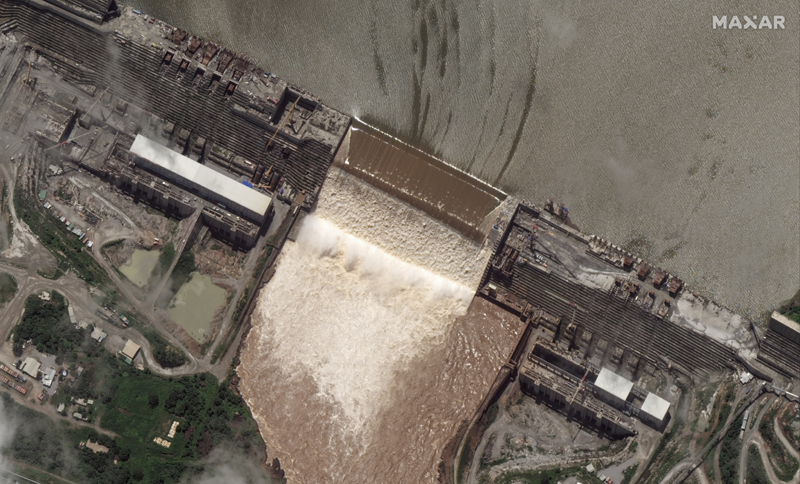Sudan PM, Egyptian official meet amid tensions over Nile dam
CAIRO: Sudan's prime minister met Tuesday with Egypt's intelligence chief in the Sudanese capital, the government said, as tensions rise over a colossal hydroelectric dam being built on the Blue Nile.
Sudan's government gave scant details about the one-day private meeting between Prime Minister Abdalla Hamdok and Abbas Kamel, saying only that it came "in the framework of bilateral relations." Kamel later met with Abdel-Fattah Burhan, head of Sudan's ruling sovereign council.
Relations between the Nile basin countries have acquired intense significance in recent weeks, as a few thousand miles upstream, Ethiopia's $4.6 billion dam, the largest in Africa, nears completion and fills with heavy seasonal rainfall.
Ethiopia is staking its hopes of becoming a major power exporter and pulling millions out of poverty on the national mega-project. Egypt fears the dam could slice into its share of the Nile, the primary source of freshwater for its 100 million people, with catastrophic consequences. Sudan stands to benefit from cheap electricity and reduced flooding, but has raised fears over the safety of its own smaller dams.
For years the three countries have engaged in repeated rounds of talks over the dam's operation. The discussions have grown increasingly testy in recent weeks as Ethiopia threatened to fill the reservoir without a long-sought deal. Experts warn a unilateral filling could push the dispute to a critical juncture.
That key moment seemed to arrive last week when Ethiopian Prime Minister Abiy Ahmed hailed the first filling of the dam's 74 billion-cubic-meter reservoir, attributing it to the torrential rains flooding the Blue Nile. But he stressed that the filling occurred naturally, "without bothering or hurting anyone else."
The announcement sparked fear and confusion downstream in Sudan and Egypt, leading Egyptian President Abdel Fattah el-Sissi to address the issue in a televised speech Tuesday at the opening of an industrial complex in Cairo.
"We are negotiating, and negotiation is a battle that will go on," he said, seeking to reassure the public that Egypt would not be drawn into an arrangement that jeopardizes its vial water supply.
"If there is no success in negotiation, what will we do?" he asked. "No, we will succeed."
El-Sissi reiterated warnings that Egypt has viewed the Nile as "a matter of life" since ancient times, acknowledging the anxiety gripping the country as "legitimate."
"I am also concerned," he said, but warned Egyptians, including popular TV commentators, against throwing around threats of military action, which he said "is not how to serve our nation's interests."
El-Sissi's comments come as African Union-mediated talks, a last-ditch attempt at a deal, drag on. Another round is set to resume next week.
Key sticking points remain, including how much water Ethiopia will release downstream if a multi-year drought occurs and how the countries will resolve any future disputes. Egypt and Sudan have pushed for a binding agreement, which Ethiopia rejects.
Sudanese Prime Minister Hamdok chaired a meeting on Tuesday to discuss "Ethiopia's unilateral filling and its impact on Sudan," according to a government statement.
In a press conference Monday in the capital, Khartoum, Sudanese Irrigation Minister Yasser Abbas criticized the dam's filling as "a concerning and harmful precedent" in negotiations, leading to "various negative impacts on Sudan."
He did not elaborate on the impacts, but last week Sudanese authorities said they recorded a startling decline in water levels at their station on the Blue Nile. Sudan's irrigation ministry accused Ethiopia of formally initiating the filling process by closing the dam gates — a move that gives Ethiopia control over the flow of the water downstream, rendering Egypt and Sudan vulnerable.






